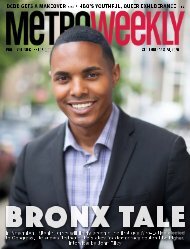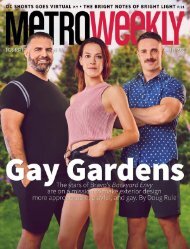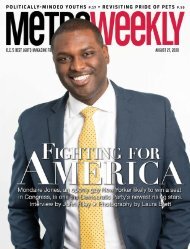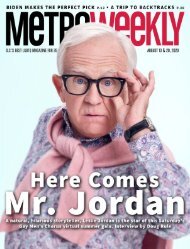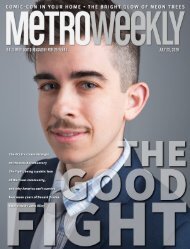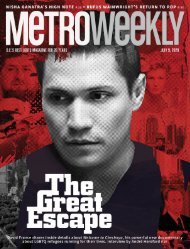Victory Fund's Annise Parker - Metro Weekly - July 16 2020
Cover Story: Annise Parker rose to become Houston’s first LGBTQ mayor. Now leading the Victory Fund, she’s helping others reach even higher. Interview by John Riley Also: The newly-rechristened Chicks return with a comeback album that showcases their greatest strengths.
Cover Story: Annise Parker rose to become Houston’s first LGBTQ mayor. Now leading the Victory Fund, she’s helping others reach even higher. Interview by John Riley
Also: The newly-rechristened Chicks return with a comeback album that showcases their greatest strengths.
You also want an ePaper? Increase the reach of your titles
YUMPU automatically turns print PDFs into web optimized ePapers that Google loves.
“My volunteer coordinator was a trans woman. Members<br />
of the Log Cabin Republicans [said] they couldn’t support<br />
me if I insisted on having her visible. I TOLD THEM THAT<br />
I WAS SORRY TO HEAR THAT, AND MAYBE WE WOULD<br />
HAVE A CONVERSATION AFTER I WON.”<br />
PARKER: Oh, they were all — my parents and my grandparents<br />
— they were all conservative Republicans. This is at a time when<br />
the state of Texas was conservative Democrats. They were contrarian.<br />
So they were all Republicans. I remember that. I do have<br />
an earlier memory, too, that absolutely made an impression. And<br />
that was when Kennedy was shot in Texas. I guess I was in the<br />
second grade, and my parents — who were absolute Goldwater<br />
supporters and very conservative — were horrified that something<br />
like this had happened in Texas.<br />
I remember the TV set being on, the old black and white TV<br />
at home, and it was all about the shooting and Kennedy lying in<br />
state. And just miles of people coming through to view the casket.<br />
The whole world stopped, and my parents, who had nothing<br />
nice to say about Kennedy, were horrified and appalled at the<br />
shooting. But we weren't a family that talked a lot about politics.<br />
It was like a civic duty. They were informed and they were<br />
engaged. My dad's parents volunteered for political campaigns<br />
in later years, but my parents didn't.<br />
MW: You mentioned coming out in high school. What was the initial<br />
reaction of your family?<br />
PARKER: I was about twelve, I guess, when I put a name to it.<br />
And at 15, we were living in an Army base in Germany. And I<br />
entered a relationship with a girl — I was 15, she was <strong>16</strong>. Her<br />
parents walked in on us one day. And we were prevented from<br />
seeing each other.<br />
My dad was in the Red Cross. He served in the military, but<br />
we were very close to military installations. And we were living<br />
on officer's row. Her dad was a sergeant. So they didn't travel<br />
in the same circles, they didn't know each other. We were prevented<br />
from seeing each other. But my parents didn't know. I<br />
was absolutely miserable. I started doing a lot of really stupid<br />
things. But I also started attending a Sunday school class with<br />
her on base so that we could see each other. And then her family<br />
relocated back to the States a year before mine did. So that was<br />
the end of that relationship.<br />
It wasn't until I was in college, my senior year in college, that<br />
I got a letter from my mom, and inside the letter from my mom<br />
was an eight-page letter from my current girlfriend's mother.<br />
And it started off: "Mrs. <strong>Parker</strong>, last year, at Rice, your daughter<br />
and my daughter had a big love affair. And I tried to end it. They<br />
won't stop it. You need to do something about it.” And she went<br />
on for eight pages. My mom just put it in an envelope and sent it<br />
to me. She didn't want to talk about it. So did my parents know?<br />
Yes. Did they want to address it? No. And I wasn't in any hurry<br />
to address it, either.<br />
MW: When did they finally get at least comfortable with addressing<br />
the idea?<br />
PARKER: It was a long time. In the mid-eighties I became the<br />
president of the Houston Gay and Lesbian Political Caucus. And<br />
my parents, at that point, were stationed in Italy. So I'd see them<br />
twice a year for a few days. I could keep secrets, I guess.<br />
I remember picking my mom up from the airport — I don't<br />
remember what year it was. She had stopped to visit friends in<br />
Charleston before she got to Houston. And she said, “Oh, so-andso<br />
in Charleston says she saw you on a national news show.” And<br />
I almost drove off the road, I was so startled. Yeah. Like, what<br />
was I thinking? I thought, “Oh, she'd never see this in Italy.” I<br />
could be on the nightly news, the 6 o'clock news.<br />
And so I took her home and I showed her the video I'd made<br />
of me being on the national news. And she looked at me, and<br />
said, “You look very pretty on TV.” I mean, I was talking about<br />
being openly gay and fighting bigots in Houston. But she just told<br />
me I looked nice on TV. We didn't actually talk about it until I<br />
was well into my 30s. The woman I was with, my wife today,<br />
[we] had been living together for a year, and my 90-year-old<br />
grandparents moved in with us so we could take care of them.<br />
And that was the catalyst for all sorts of family conversations,<br />
because we just had to recognize that if they were going to<br />
be living with us, that we shared a bedroom. We shared all of<br />
these things, and the whole family needed to understand that<br />
we would take care of them, but that we would be doing it as a<br />
couple. It wasn't my roommate, and let's just get those things out<br />
of the way. And we did.<br />
MW: You and your wife have been together for almost 30 years.<br />
What has family life been like?<br />
PARKER: It’s been an interesting journey. We'd been together<br />
a year and my ninety-year-old grandparents moved in with us.<br />
And we took care of them. My grandfather died. My grandmother<br />
is in a nursing home. We took in a <strong>16</strong>-year-old street<br />
kid who came to live with us. We never formally adopted him,<br />
but he’s our son and he’s 44 years old now. And so, we built the<br />
family organically. We adopted two girls, a seven-year-old and<br />
a twelve-year-old, from the State of Texas Children's Services,<br />
out of foster care. And then later, our third daughter, a 15-yearold,<br />
joined us. And so we've been through the informal fostering<br />
process and the formal adoption process. It’s fortunate for me<br />
that I had a lot of schedule flexibility, and my wife has been<br />
self-employed throughout our time together. So we were the<br />
homeroom moms. We were the ones who came to all the school<br />
productions, and showed up at the activities. We were blessed<br />
to be able to do that.<br />
MW: You worked in the oil industry prior to entering politics. How<br />
did you make that transition?<br />
PARKER: Well, I was an active community volunteer. And at that<br />
point, I was no longer a fly on the wall. I was leading LGBTQ<br />
organizations in the mid-eighties and on. But it never occurred<br />
to me, why not run myself, because it was not my personality.<br />
But in 1991, I was recruited to run for a city council seat to represent<br />
the LGBTQ community. There was a major redistricting<br />
battle going on. We were to redistrict the city council and var-<br />
26<br />
JULY <strong>16</strong>, <strong>2020</strong> • METROWEEKLY.COM




